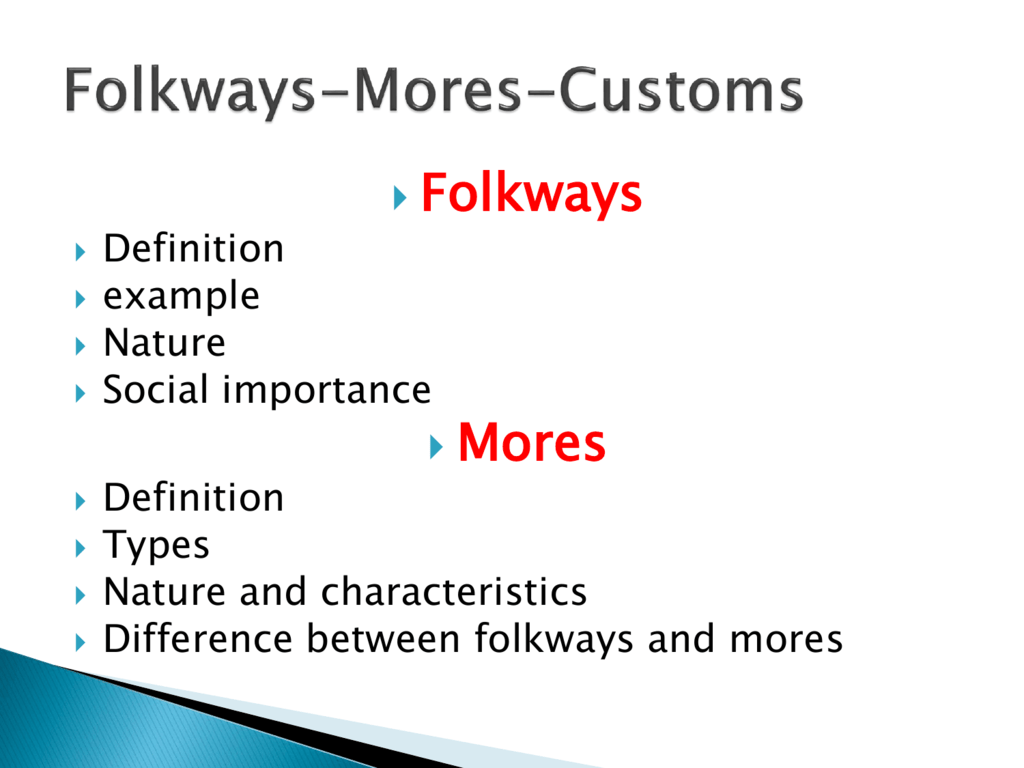Have you ever felt a pang of guilt for cutting in line, even though no one was watching? Or noticed a sense of discomfort when someone starts eating with their hands in a fancy restaurant? These subtle feelings, often accompanied by a quiet judgment, point to a powerful force at play in society – mores.

Image: studylib.net
Mores, in the realm of sociology, are the unwritten rules that guide our behavior, shaping our beliefs and actions within a society. They are the unspoken agreements about what is right and wrong, acceptable and unacceptable, often rooted in deeply held moral principles and values. This article will delve deeper into the concept of mores, exploring their origin, impact, and real-world examples, and how they continue to mold our lives.
The Roots of Mores: A Journey Through Time
Understanding mores requires tracing back their origins to the very fabric of human society. Think of early civilizations, where individuals relied on shared norms and values to maintain order and cohesion. Mores emerged as a way to ensure survival, promote cooperation, and preserve traditions. As societies grew and evolved, mores adapted, reflecting the changing values and beliefs of the time.
For example, in ancient Rome, where societal structure was heavily reliant on family and lineage, strict mores guided marriage, family dynamics, and even the right to vote. This example demonstrates how deeply rooted mores can be, shaping not only individual behaviors but the very foundations of society.
Defining Mores: Beyond Mere Social Norms
While often used interchangeably with “social norms,” mores stand apart due to their weightier moral implications. Social norms encompass a wider range of expectations and customs, ranging from simple formalities like saying “please” and “thank you” to more complex protocols in specific settings, such as dressing appropriately for a job interview.
Mores, however, carry the force of morality, often embodying ethical principles and moral values. They are considered fundamental to societal well-being, often underpinned by religious beliefs, cultural traditions, or shared societal values. Violations of mores are often viewed as deeply offensive, leading to strong social disapproval, even legal repercussions in some cases.
Examples of Mores in Action
To understand the impact of mores, let’s look at some real-world examples:
- Honesty: Societies universally consider honesty to be a fundamental virtue. Lying, cheating, and stealing are seen as violations of this core moral principle, often leading to severe consequences.
- Respect for Elders: Many cultures hold a deep respect for older generations. This can manifest in various ways, including deferring to their advice, taking care of their needs, and avoiding disrespectful language or actions towards them.
- Family Values: The importance of family varies across cultures, but many societies consider it a sacred institution. Mores related to family life guide marriage practices, raising children, and the roles of different family members, with strong expectations for loyalty and support.
- Religious Observances: Particularly in societies with strong religious traditions, mores guide daily practices and rituals. Following prescribed religious observances is considered essential, with violations often perceived as a challenge to the very core of the society’s beliefs.

Image: helpfulprofessor.com
The Evolving Landscape of Mores
Mores are not static entities. They are constantly evolving, reflecting shifting societal values, advancements in technology, and broader cultural changes. For instance, the changing views on same-sex relationships in many parts of the world have led to the redefinition of mores surrounding marriage, family, and social acceptance.
The development of the internet and social media has also dramatically impacted mores. The spread of information and communication technologies has challenged traditional norms, creating new ethical dilemmas and prompting re-evaluations of existing mores. The rise of online bullying, privacy concerns, and the spread of misinformation are examples of how technology has forced societies to grapple with evolving mores.
The Power of Mores in Shaping Social Order
Mores play a critical role in maintaining social order, providing a framework for interpreting right and wrong, and fostering a sense of shared values. They help individuals navigate complex social situations, promote cooperation, and encourage conformity to the established norms of society. By providing a moral compass, mores help to guide behavior, minimize conflict, and ensure the smooth functioning of social institutions.
However, it’s important to acknowledge that what constitutes a “moral” behavior can vary significantly across cultures and societies. Mores can, at times, contribute to social inequalities, as they may reflect and perpetuate existing power structures, prejudices, and biases. This reinforces the importance of critical thinking and questioning existing mores to ensure they align with a just and equitable society.
Navigating a World of Changing Mores
In today’s increasingly interconnected and diverse world, navigating the intricate tapestry of mores requires careful awareness and thoughtful engagement. As we encounter individuals from different backgrounds and cultural perspectives, understanding the underlying values that shape their behaviors becomes crucial for fostering harmonious relationships and building a more inclusive society.
Recognizing the dynamic nature of mores and embracing open dialogue about evolving norms are critical for promoting understanding, challenging outdated practices, and creating a more equitable and just future. The power of mores lies not only in their ability to maintain social order but also in their potential to guide us towards a more compassionate and inclusive world, where shared values embrace diversity and respect for all.
Define Mores In Sociology
Conclusion
Understanding mores as an integral aspect of sociology provides a valuable lens for examining societal structures, cultural influences, and the complex dance of human behavior. From the unwritten rules that guide our daily actions to the deeply held moral principles that shape our beliefs, mores shape the very fabric of our communities. As we navigate the ever-changing landscape of social norms, embracing a critical lens, fostering open dialogue, and appreciating the diversity of cultures will ensure we build a more inclusive and equitable world, guided by a shared commitment to empathy and respect.






